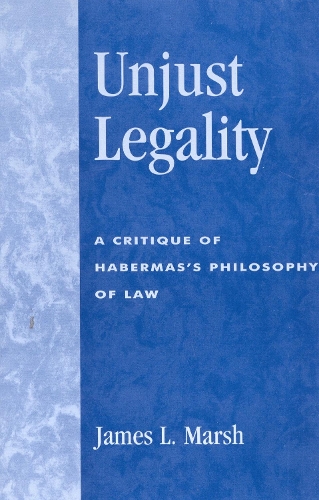
Unjust Legality: A Critique of Habermas's Philosophy of Law
(Paperback)
Publishing Details
Unjust Legality: A Critique of Habermas's Philosophy of Law
By (Author) James L. Marsh
Bloomsbury Publishing PLC
Rowman & Littlefield Publishers
16th October 2001
United States
Classifications
General
Non Fiction
Methods, theory and philosophy of law
340.1
Physical Properties
Paperback
224
Width 141mm, Height 222mm, Spine 13mm
277g
Description
This is an interpretation and critique of Habermas's philosophy of law in his "Between Facts and Norms". James Marsh feels that, while Habermas is insightful in laying out a new conceptual and methodological foundation for the philosophy of law, the book is flawed by a fundamental contradiction: the notion of a democracy ruled by law and capitalism. As capitalism is essentially undemocratic both in its internal economic workings and its intended, structural effect on culture and politics, it must adversely affect the most important institutions in western democratic society: the legislature, judiciary, state administration and public sphere. As a result, instead of a nation effectively "of, by, and for the people", there exists one that is essentially "of, by, and for capital".
Reviews
Professor Marsh, a self-styled 'disillusioned Habermasian,' offers a careful, somber 'reality check' to the comparatively favorable vision of contemporary society that Habermas presents in his significant work, Between Facts and Norms. At the sametime, the ultimate, and in fact quite successful, aim of Marsh's analysis is the positive one of reworking Habermas' own best insights back in the direction of a genuinely critical theory of modern society.... -- William L. McBride, Purdue University
Marsh has produced an outstanding and accessible text that provides a badly needed left critique of Habermas' philosophy of law. * Science & Society *
Marsh displays an impressive mastery of Habermas's texts that few others have attained. His commentary on Between Facts and Norms is exceptionally clear and jargon-free, not to mention chock full of illuminating examples and references to the real world. Above all, its sympathetic treatment of the basic project of Habermas's masterpiece is judiciously balanced by a critique of Habermas's failure to consistently carry that project through to the end.... -- David Ingram, Loyola University, Chicago
Marsh displays an impressive mastery of Habermas's texts that few others have attained. His commentary on Between Facts and Norms is exceptionally clear and jargon-free, not to mention chock full of illuminating examples and references to the real world. Above all, its sympathetic treatment of the basic project of Habermas's masterpiece is judiciously balanced by a critique of Habermas's failure to consistently carry that project through to the end. -- David Ingram, Loyola University, Chicago
Professor Marsh, a self-styled 'disillusioned Habermasian,' offers a careful, somber 'reality check' to the comparatively favorable vision of contemporary society that Habermas presents in his significant work, Between Facts and Norms. At the same time, the ultimate, and in fact quite successful, aim of Marsh's analysis is the positive one of reworking Habermas' own best insights back in the direction of a genuinely critical theory of modern society. -- William L. McBride, Purdue University
Author Bio
James L. Marsh is professor of philosophy at Fordham University in Bronx, New York.
